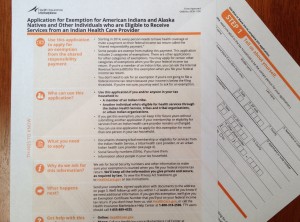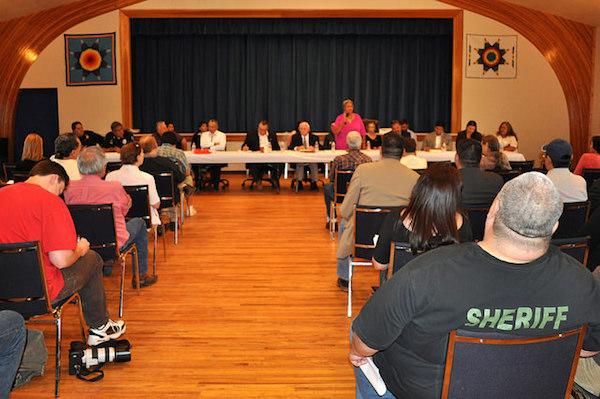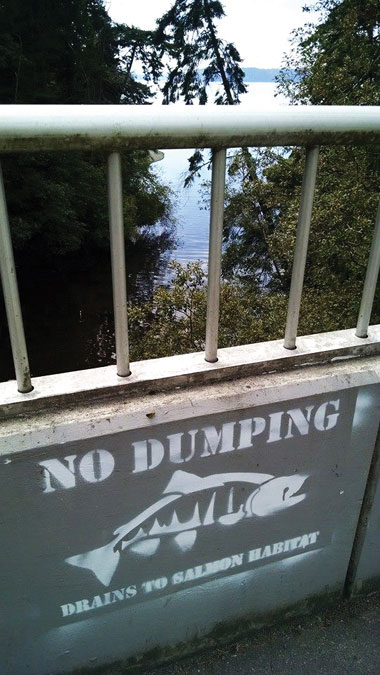BEN NEARY, Associated Press
CHEYENNE, Wyo. (AP) — American Indians in Wyoming increasingly are asserting themselves, fighting for more say on environmental issues and fielding more candidates in state and local elections.
The Northern Arapaho and Eastern Shoshone tribes share the Wind River Indian Reservation, a block of land in central Wyoming that’s roughly the size of Yellowstone National Park.
Rep. Patrick Goggles, D-Ethete, announced early this year he’s not seeking re-election to the Legislature after 10 years of representing a district centered on the reservation. Yet Goggles, a Northern Arapaho and the only Indian in the Legislature, said it’s critical that the tribes continue to have a political presence in the state.
“There are issues that are unique to this reservation, and to the other Native Americans that reside here,” Goggles said. “That perspective should not get lost.”
Democrat Andi Clifford, a Northern Arapaho, is running for Wyoming House of Representatives seeking the District 33 seat held by Goggles, her uncle. Clifford, 42, works as a manager at the Wind River Hotel and Casino.
“We have 2.2 million acres with a lot of resources in our land and water,” Clifford said. “We want to be sitting at the table. We want to start discussing things that impact us and start having those conversations, and people to respect those conversations and respect where we’re coming from, because we live here.”
Gary Collins, tribal liaison between the Northern Arapaho Tribe and the state of Wyoming, said he counts seven Native American candidates in area legislative and local elections this year, up from three in 2012.
Collins, a Northern Arapaho, said a victory he and other tribal members won in a Voting Rights Act lawsuit against Fremont County a few years ago has inspired greater political involvement among Wyoming Indians.
U.S. District Judge Alan B. Johnson in 2010 ruled Fremont County’s system of at-large voting for county commissioner elections left Indians disenfranchised. Despite bitter opposition from county officials, Johnson ordered the county to establish voting districts to ensure Indian representation.
“The long history of discrimination against Indians in the United States, Wyoming and Fremont County is undeniable,” Johnson wrote in his 2010 decision. “The evidence presented to this court reveals that discrimination is ongoing and the effects of historical discrimination remain palpable.”
The U.S. Environmental Protection Agency added to local tensions late last year when it ruled that lands around Riverton, a town on the reservation’s eastern boundary, legally remain Indian Country.
The EPA addressed the boundary issue when it granted a request from both the Northern Arapaho and Eastern Shoshone tribes to treat their reservation as a separate state under the federal Clean Air Act.
Wyoming, together with Riverton, Fremont County and other groups, has appealed the EPA decision in federal court in Denver. The tribes have entered the lawsuit, too, arguing to uphold the federal agency’s position.
The tribal boundary dispute also drew the attention of a national group that’s dedicated to ending tribal sovereignty. The Citizens Equal Rights Alliance held a workshop in Riverton in June, saying they wanted to instruct local officials how to fight over federal government overreach.
Sen. Cale Case, R-Lander, is a veteran state lawmaker and a non-Indian. He faces Democratic challenger Sergio Maldonado Sr., a Northern Arapaho, in November’s general election.
Case said he was invited to the CERA workshop but didn’t attend. Although he said he believes the state ultimately will win on the boundary issue in court, he said he regarded CERA’s presence as unhelpful and divisive.
Case served as chairman of the legislative committee that redrew legislative districts after the 2010 census. He said the committee was careful not to dilute Native American voting strength and credits that as a factor in their increasing involvement.
Case said all voters in his district will have to assess which candidate they believe can do the best job. “I’m not native, but I really try very hard to do a good job of representing them,” Case said.
Kimberly Varilek, attorney general for the Eastern Shoshone Tribe, said she believes both the Voting Rights Act ruling and the uproar over the EPA boundary decision both have given tribal members hope that they have a chance to play a greater role in politics beyond the reservation boundaries.
“I’ve noticed that there’s more interest in regards to tribal members,” Varilek said. “Potentially, maybe they feel like there’s more access.”
Copyright 2014 The Associated Press. All rights reserved. This material may not be published, broadcast, rewritten or redistributed.


















